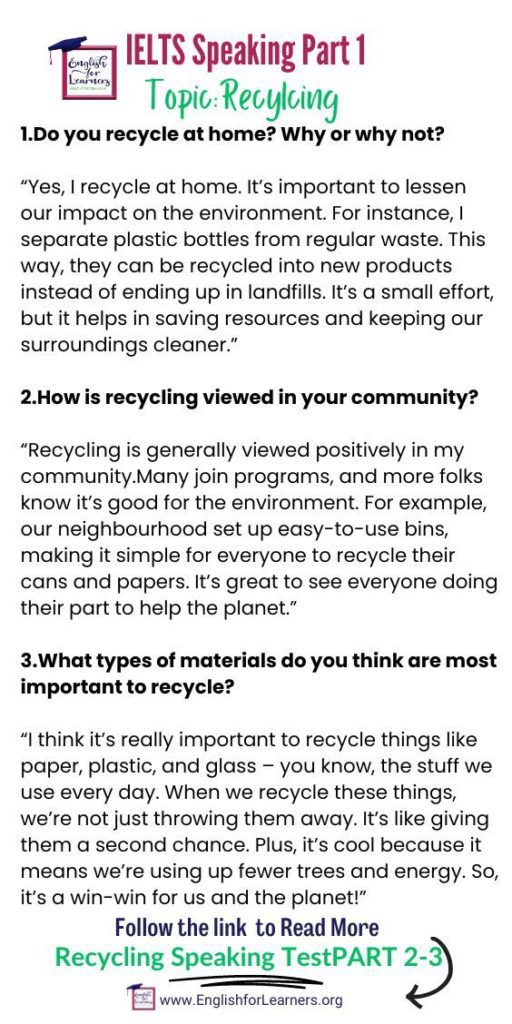Recycling IELTS Speaking topic is a contemporary topic for the test and offers many different questions about recycling from various angles. In this post, we will go through some sample topics for IELTS speaking test on the topic of recycling with their sample answers.
Let’s begin from Part 1 of the speaking test.
In part 1 of IELTS Speaking, you will be asked some simple introductory questions about yourself and some questions about your hobbies or interests. If the topic of recycling arises, the questions could resemble the following examples.
Recycling IELTS Speaking Part 1 | Sample Q/A about Recycling
1.Do you recycle at home? Why or why not?
“Yes, I recycle at home. It’s important to lessen our impact on the environment. For instance, I separate plastic bottles from regular waste. This way, they can be recycled into new products instead of ending up in landfills. It’s a small effort, but it helps in saving resources and keeping our surroundings cleaner.”
2.How is recycling viewed in your community?
“Recycling is generally viewed positively in my community.Many join programs, and more folks know it’s good for the environment. For example, our neighbourhood set up easy-to-use bins, making it simple for everyone to recycle their cans and papers. It’s great to see everyone doing their part to help the planet.”
3.What types of materials do you think are most important to recycle?
“I think it’s really important to recycle things like paper, plastic, and glass – you know, the stuff we use every day. When we recycle these things, we’re not just throwing them away. It’s like giving them a second chance. Plus, it’s cool because it means we’re using up fewer trees and energy. So, it’s a win-win for us and the planet!”

Recycling IELTS Speaking Part 2 Cue Card
Describe a recycling program or initiative that you find interesting.
- When did you first learn about it?
- How does it work?
- Why do you find it interesting?
Sample Answer
There’s this really interesting recycling initiative I came across in my town. I got wind of it last spring when they launched a new program targeting electronic waste. It caught my attention because, you know, we all have old gadgets lying around. This program sets up collection points for things like old phones, chargers, and even broken headphones. They then partner with electronic recycling companies to safely dismantle and recycle these items. I learned about it through a community event they organized, showcasing how the process works.
So, instead of tossing out those old gadgets and adding to electronic waste, you drop them off at these collection points. They make it so convenient, especially with drop-off locations at local stores.
What makes it interesting is that they’re not only dealing with the usual recyclables; they’re addressing a specific issue like electronic waste, which often gets overlooked. It’s making recycling more accessible and purposeful for everyone in the community.
Recycling IELTS Speaking Part 3
1.In your opinion, how can governments encourage more people to recycle?
Sample Answer
One way I think governments could push recycling is by spreading the word more. Like, have these cool campaigns to get people excited about it. And, throwing some perks; Like, businesses could get a tax break for going eco-friendly ; like eco friendly products, cutting down on waste, promoting recycling within the company etc– that’d be a win-win! Also, making recycling spots easier to find and use would be awesome. It’s all about making it simple for everyone. Plus, they should team up with communities, make it a team effort to get the word out about why recycling matters. That’s how I see it.
2.What role do schools play in teaching students about recycling?
Sample Answer
Schools play a crucial role in teaching students about recycling.blend it into lessons, like making science about saving the planet. Some schools add a dynamic touch to it with friendly recycling competitions between classes – who can gather the most stuff.
Additionally, students get hands-on with projects, like creating cool art from recycled materials or growing a little garden using compost from lunch leftovers. It’s not just about passing tests; it’s about growing up with a love for the planet.
3.Do you think recycling is important?
Sample Answer
Absolutely, I believe recycling is incredibly important. It’s not just about tossing things in a different bin – it’s a way we can all do our part to help the environment. When we recycle, we’re giving used materials a chance to become something new instead of just ending up as waste. It’s like a small action that adds up to a big positive impact on our planet. So yeah, recycling is definitely something we should all be doing.
4.As a student, why is recycling important?
Sample Answer
As a student, I see recycling as crucial for a few reasons. Firstly, it’s a way to reduce the amount of waste we generate, and that’s important because overflowing landfills are a serious issue. Secondly, recycling helps save valuable resources like trees, water, and energy by reusing materials instead of constantly producing new ones.
As students, adopting recycling habits not only establishes a sense of responsibility towards the environment but also sets a positive example for our peers and future generations. It’s a small but meaningful way to make a positive impact on the planet we inhabit.
5.Are there any challenges or obstacles to effective recycling that you can identify?
Sample Answer
Certainly, there are a few challenges to effective recycling that I can point out. Sometimes, not all places have the right setup for recycling, making it tricky for people to do it easily. Also, there’s confusion about what things can be recycled, so sometimes, things that could be reused end up in the wrong bin.Plus, not everyone knows how recycling helps the environment, so they might not see it as important. Another thing is that the process of recycling can sometimes be expensive or not available everywhere. So, to make recycling work better, we need to have clearer rules, spread more awareness, and make it easier for everyone to join in.


